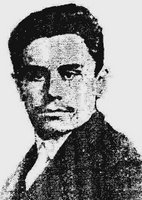'Against Such Things There is No Law'

Marxist legal theorist Evgeny Pashukanis was born on this date in 1891.
A Russian of Lithuanian parentage, Pashukanis joined the Bolsheviks in 1912, and following the Russian Revolution in 1917 became a leading writer in Soviet jurisprudence. Unlike other Soviet legal writers, however, who thought that pre-Revolutionary forms (i.e. laws and courts) could be adapted to serve the cause of the Revolution by changing the content of the laws and putting revolutionaries in positions of authority on the courts, Pashukanis' critique began with the radical view that the concept of "law" itself was an outgrowth of capitalist society -- a product of the capitalist's desire to protect property and dominate the proletariat -- and that in its highest evolution a post-capitalist society would see a "withering away" of the law in favor of new forms of social behavior and organization based on the absence of commodity fetishism, much like the "withering away of the state" proposed by Karl Marx himself.
Pashukanis' vision of a disappearance of laws echoes the brash optimism of a revolutionary from another period -- the Apostle Paul in his Epistle to the Galatians, in which he writes: "Christ redeemed us from the curse of the law, having become a curse for us . . . Stand firm therefore in the liberty by which Christ has made us free, and don’t be entangled again with a yoke of bondage . . . the fruit of the Spirit is love, joy, peace, patience, kindness, goodness, faith, gentleness, and self-control. Against such things there is no law."
There is, of course, much that separates theoretical Christianity from theoretical Marxism -- but at the core of both Paul and Marx was a fervent belief in the better part of one's nature, unlocked within a new order of social relations, as well as a hopeful expectation of ethical expression that can only come from within, and not from an old set of rules.
Pashukanis' critique of the nature of legal authority was destined to be short-lived within the atmosphere of terror imposed by Soviet dictator Joseph Stalin, who gave lip service to Marxism as Pashukanis and the theorists saw it, but ruled as a despot. At the age of 46, Pashukanis was murdered by Stalin's secret police, and his writings were burned by the Soviets, only to reappear in translation in the 1950s.
Labels: Christian History, Juris History, Legal History, Marxism, Philosophy





0 Comments:
Post a Comment
Subscribe to Post Comments [Atom]
<< Home